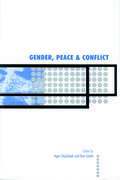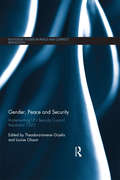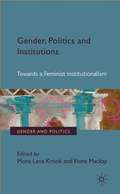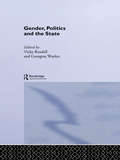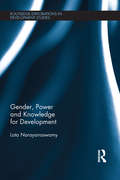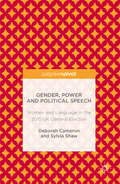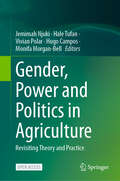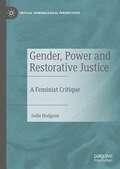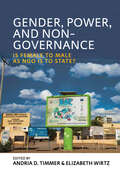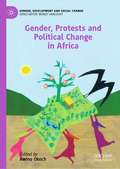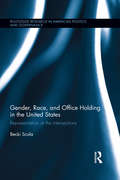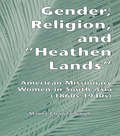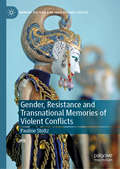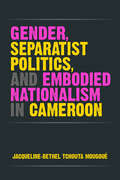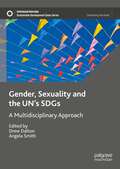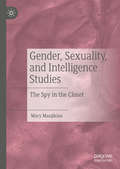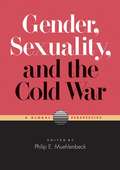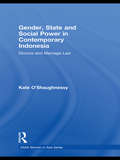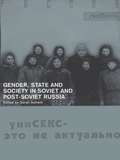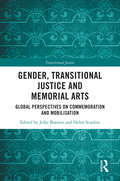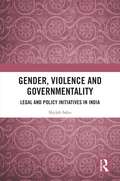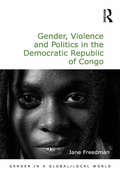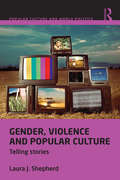- Table View
- List View
Gender, Peace and Conflict (International Peace Research Institute, Oslo (PRIO))
by Dan Smith Inger Skjelsbæk- What impact does gender difference make to political decision-making? - Will the political empowerment of women contribute to a more peaceful world? The role of gender has been increasingly recognized as central to the study and analysis of the traditionally male domains of war and international relations. This book explores the key role of gender in peace research, conflict resolution and international politics. Rather than simply 'add gender' the aim is to transcend different disciplinary boundaries and conceptual approaches to provide a more integrated basis for future study. To this end it uniquely combines theoretical chapters alongside empirical case studies to demonstrate the importance of a gender perspective to both theory and practice in conflict resolution and peace research. The theoretical chapters explore the gender relationship and engage with the many stereotypical dichotomies like femininity and peace and masculinity and war. The case study chapters (drawing on examples from South America, South Asia and Europe, including former Yugoslavia) move beyond theoretical critique to focus on issues like sexual violence in war, the role of women in military groups and peacekeeping operations and the impact of a 'critical mass' of women in political decision-making. Gender, Peace and Conflict will provide an invaluable survey and new insights to a central area of contemporary research. It will be essential reading for academics, students and practitioners across peace studies, conflict resolution and international politics.
Gender, Peace and Security: Implementing UN Security Council Resolution 1325 (Routledge Studies in Peace and Conflict Resolution)
by Theodora-Ismene Gizelis and Louise OlssonThis volume explores the implementation of key gender policies in international peace and security, following the adoption of UN Security Council resolution 1325 in October 2000, the first thematic resolution on Women, Peace and Security. How should we understand women’s participation in peace processes and in peace operations? And what forms of gendered security dynamics are present in armed conflict and international interventions? These questions represent central themes of protection and participation that the international community has to address in order to implement UNSCR 1325. Thus far, the implementation has often employed varying approaches related to gender mainstreaming, a third theme of the resolution. Yet, there is a dearth of systematic data which until recently has restricted the ability of researchers to evaluate the progress in implementation and impact of UNSCR 1325. By engaging with both empirics and critical theory, the authors of this edited volume make important contributions to the gender, peace and security agenda. They identify some of the problems of implementing UNSC 1325 and offer a sobering assessment of progress of implementation and insights into how to advance our understanding through systematic research. Many of the chapters are focused on operational aspects of UNSCR 1325, but all also engage with the theoretical underpinnings of UNSCR 1325 to bring forth central debates on more fundamental challenges to the development of knowledge in the fields of gender, peace and security. This book will be of much interest to students of gender studies, peace and conflict studies, security studies and IR in general.
Gender, Politics and Institutions
by Mona Lena Krook Fiona MackayPolitical institutions profoundly shape political life and are also gendered. This groundbreaking collection synthesises new institutionalism and gendered analysis using a new approach - feminist institutionalism - in order to answer crucial questions about power inequalities, mechanisms of continuity, and the gendered limits of change.
Gender, Politics and Society in Ukraine
by Olena Hankivsky Anastasiya SalnykovaGender, Politics, and Society in Ukraine is the first collection to examine how political, social, and economic transitions in post-Communist Ukraine are transforming gender roles and relations within the country. Leading Western and Ukrainian scholars and practitioners address a wide range of effects associated with and reinforced by these transitions - including the breakdown of the general welfare system, the lack of progress in the development of the healthcare system, gender inequality in political representation, the patriarchal nature of nation building, human trafficking, domestic violence, changing conceptions of fatherhood and masculinity, homelessness, and LGBT issues - from a variety of methodological and disciplinary perspectives.Gender, Politics, and Society in Ukraine is particularly innovative in its exploration of both women's and men's experiences and the ways in which gender relations shift over time in societies undergoing transitions to democracy. As such, this volume furthers the understanding of the complex obstacles and challenges of working towards gender equality in evolving democracies and identifies future priorities for research, politics, and policy development.
Gender, Politics and the State
by Georgina Waylen Vicky RandallOver the last two decades our understanding of the relationship of gender, politics and the state has been transformed almost beyond recognition by the mutual interrogation of feminism and political science. This volume provides an overview of this dynamic and growing field, which reflects both its expanding empirical scope and the accompanying theoretical development and debate.The first three essays focus primarily on conceptual and theoretical issues: the meaning of 'gender'; the state's role in the construction of gender within the public and private sphere; and the political representation of gender differences within liberal democracy. The remaining six provide analyses of more concrete issues of state policy and participation in differeing national political contexts: abortion politics in Ireland; the local politics of prostitution in Britain, the impact on women's political participation of economic change in China, Latin America and political change in Russia, and the gender impact of state programmes of land reform.
Gender, Power and Knowledge for Development (Routledge Explorations in Development Studies)
by Lata NarayanaswamyKnowledge-for-development is under-theorised and under-researched within development studies, but as a set of policy objectives it is thriving within development practice. Donors and other agencies are striving to improve the flow of information within and between decision-makers and so-called ‘poor and marginalized groups’ in order to promote economic and social development, including the empowerment of women. Gender, Power and Knowledge for Development questions the assumptions and practice of the knowledge-for-development industry. Using a qualitative, multi-site ethnographical study of a Northern-based gender information service and its ‘beneficiaries’ in India, the book queries the utility of the knowledge paradigm itself and the underlying assumption that a knowledge deficit exists in the Global South. It questions the value of practices designed to address this presumed deficit that seek to increase information without addressing the specific problems of the knowledge systems being targeted for support. After reviewing the evidence, the book recommends that international organisations, governments and practitioners move away from the belief that information intermediaries can employ progressive correctives to ‘tinker at the edges’ and thus resolve the shortcomings of on-going attempts to use knowledge alone as a driver of development. Gender, Power and Knowledge for Development will be of great interest to researchers, students in development studies, gender studies, and communication studies as well as INGOs, donor agencies and groups engaged in information for development (i4D), ICT for development (ICT4D), Tech4Dev, knowledge mobilization and knowledge-for-development (K4D).
Gender, Power and Political Speech
by Deborah Cameron Sylvia ShawGender, Power and Political Speech explores the influence of gender on political speech by analyzing the performances of three female party leaders who took part in televised debates during the 2015 UK General Election campaign. The analysis considers similarities and differences between the women and their male colleagues, as well as between the women themselves; it also discusses the way gender - and its relationship to language - was taken up as an issue in media coverage of the campaign.
Gender, Power and Politics in Agriculture: Revisiting Theory and Practice
by Hugo Campos Jemimah Njuki Vivian Polar Hale Ann Tufan Monifa Morgan-BellThis is a open access book. In the agriculture sector, the language of gender integration often ignores the politics and the power dynamics that are central to critical, and feminist, analysis of gender relations. This volume explores largely neglected topics such as power dynamics, masculinities, gendered social norms, feminist research practice, intersectionality, critical analysis of tools and more, that are fundamental to shifting the entrenched power dynamics and politics of gender research in agriculture. The purpose of this book is to reduce the gap existing between theory, methods, and practice of gender relations in agriculture and agricultural research. Through an in-depth analysis of current processes in agriculture and drawing on existing experiences in other sectors, it seeks to create pathways for learning, catalyzing change and positive impact on gender equity and social inclusion. This volume seeks to bring forth a change in how gender relations in agriculture are researched, practiced and taught.
Gender, Power and Restorative Justice: A Feminist Critique (Critical Criminological Perspectives)
by Jodie HodgsonThis book ties restorative justice into the exercise of patriarchal power. It is focused on the individual narratives of 15 girls and young women who have participated in a victim-offender restorative justice (RJ) conference and the perspectives of youth justice practitioners. Gender, Power and Restorative Justice expands feminist engagement with RJ by focusing critical attention on the importance of the social construction of gender, the exercise of power, shame, stigma, muting and resistance to girls’ experiences of RJ conferencing. Drawing upon recent developments to the sociology of stigma and feminist perspectives on shame, the book contends that RJ conferencing can produce harmful implications for girls and young women who participate. Ultimately it is argued that anti-carceral, social policy alternatives, underpinned by feminist praxis, should replace a youth justice jurisprudence for girls. This book will be of particular use and interest to those studying modules on criminology, youth justice, criminal justice and social work courses.
Gender, Power, and Non-Governance: Is Female to Male as NGO Is to State?
by Andria D. Timmer and Elizabeth WirtzUsing Sherry Ortner’s analogy of Female/Nature, Male/Culture, this volume interrogates the gendered aspects of governance by exploring the NGO/State relationship. By examining how NGOs/States perform gendered roles and actions and the gendered divisions of labor involved in different types of institutional engagement, this volume attends to the ways in which gender and governance constitute flexible, relational, and contingent systems of power. The chapters in this volume present diverse analyses of the ways in which projects of governance both reproduce and challenge binaries.
Gender, Protests and Political Change in Africa (Gender, Development and Social Change)
by Awino OkechThis book brings together conceptual debates on the impact of youth-hood and gender on state building in Africa. It offers contemporary and interdisciplinary analyses on the role of protests as an alternative route for citizens to challenge the ballot box as the only legitimate means of ensuring freedom. Drawing on case studies from seven African countries, the contributors focus on specific political moments in their respective countries to offer insights into how the state/society social contract is contested through informal channels, and how political power functions to counteract citizen’s voices. These contributions offer a different way of thinking about state-building and structural change that goes beyond the system-based approaches that dominate scholarship on democratization and political structures. In effect, it provides a basis for organizers and social movements to consider how to build solidarity beyond influencing government institutions.
Gender, Race, and Office Holding in the United States: Representation at the Intersections (Routledge Research in American Politics and Governance)
by Becki ScolaOver the past several decades, the number of women elected to higher office in the United States has grown substantially. However, when the electoral gains of women are considered on a state-by-state basis, there are observable variations in the rate by state at which women are elected to state legislative office. Scholars have noted an additional variation in women office holders: that women of color serve at higher rates than white women. Becki Scola’s book provides an explanation for these two interrelated puzzles on electoral gender gaps. She examines the factors surrounding the uneven proportional distribution of female legislators, and then explores why gender appears to be an advantage for women of color office holders. Through an examination of the divergent state-level institutional and environmental conditions, Scola maps out the factors that contribute to more, or less, female legislative service and how race/ethnicity intersects with these conditions. She reveals that the common conceptions and theories that help us understand women’s office holding in general do not equally apply to both white women and women of color’s legislative service.. The first book-length study to analyze how race informs gender in terms of patterns of office holding, Gender, Race, and Office Holding in the United States provides insight into both underrepresentation in general as well as the underlying dynamics of representation within specific groups of women.
Gender, Religion, and the Heathen Lands: American Missionary Women in South Asia, 1860s-1940s (Gender, Culture and Global Politics #4)
by Maina Chawla SinghSeeking to extend existing scholarship on gender and colonialism and on women and American religion, this cross-cultural study examines the work of American missionary women in South Asia at several levels. A primary concern of the study is to historicize the interventions of these women and situate them within the dual contexts of the sending society and the receiving culture. It focuses on missionaries Isabella Thoburn and Ida Scudder, who founded some of the premier women's colleges and hospitals in British colonial India. The book also draws upon the narratives and reminiscences of South Asian women, now in their seventies, who attended such institutions in the 1940s, and whose voices texture our understanding of American women's missionary work in "Other" cultures.
Gender, Resistance and Transnational Memories of Violent Conflicts (Memory Politics and Transitional Justice)
by Pauline StoltzThis book investigates the importance of gender and resistance to silences and denials concerning human rights abuses and historical injustices in narratives on transnational memories of three violent conflicts in Indonesia. Transnational memories of violent conflicts travel abroad with politicians, postcolonial migrants and refugees. Starting with the Japanese occupation of Indonesia (1942–1945), the war of independence (1945–1949) and the genocide of 1965, the volume analyses narratives in Dutch and Indonesian novels in relation to social and political narratives (1942–2015). By focusing on gender and resistance from both Indonesian and Dutch, transnational and global perspectives, the author provides new perspectives on memories of the conflicts that are relevant to research on transitional justice and memory politics.
Gender, Separatist Politics, and Embodied Nationalism in Cameroon (African Perspectives)
by Jacqueline-Bethel Tchouta MougouéGender, Separatist Politics, and Embodied Nationalism in Cameroon illuminates how issues of ideal womanhood shaped the Anglophone Cameroonian nationalist movement in the first decade of independence in Cameroon, a west-central African country. Drawing upon history, political science, gender studies, and feminist epistemologies, the book examines how formally educated women sought to protect the cultural values and the self-determination of the Anglophone Cameroonian state as Francophone Cameroon prepared to dismantle the federal republic. The book defines and uses the concept of embodied nationalism to illustrate the political importance of women’s everyday behavior—the clothes they wore, the foods they cooked, whether they gossiped, and their deference to their husbands. The result, in this fascinating approach, reveals that West Cameroon, which included English-speaking areas, was a progressive and autonomous nation. The author’s sources include oral interviews and archival records such as women’s newspaper advice columns, Cameroon’s first cooking book, and the first novel published by an Anglophone Cameroonian woman.
Gender, Sexuality and the UN's SDGs: A Multidisciplinary Approach (Sustainable Development Goals Series)
by Angela Smith Drew DaltonAgainst the backdrop of Covid-19, this edited volume will utilize a gendered lens to explore the United Nation’s Sustainable Development Goals (SDGs), with a clear focus on challenging the omission of sexuality in relation to the SDGs as well as analyzing the ways in which the SDGs are also equally relevant for Western countries. While acknowledging the importance of these goals, contributors unpack the exclusion of marginalized genders and sexualities as well as how popular media and social media contribute to the wider understanding of issues of gender and sexuality and the SDGs. This volume also dispels assumptions about the irrelevance of SDGs to countries in the West, with a particular focus on the UK. Chapters examine a variety of topics including: HIV/AIDS, sex work, global migration, climate change and environmental sustainability, poverty, education, and sexual harassment. This collection will be of interest to scholars, researchers, and students across Sociology, Gender & Sexuality Studies, Education, Development Studies and Sustainability Studies.
Gender, Sexuality, and Intelligence Studies: The Spy in the Closet
by Mary ManjikianThis is the first work to engage with intelligence studies through the lens of queer theory. Adding to the literature in critical intelligence studies and critical international relations theory, this work considers the ways in which both the spy, and the activities of espionage can be viewed as queer. Part One argues that the spy plays a role which represents a third path between the hard power of the military and the soft power of diplomacy. Part Two shows how the intelligence community plays a key role in enabling leaders of democracies to conduct covert activities running counter to that mission and ideology, in this way allowing a leader to have two foreign policies—an overt, public policy and a second, closeted, queer foreign policy.
Gender, Sexuality, and the Cold War: A Global Perspective
by Philip E. MuehlenbeckAs Marko Dumančić writes in his introduction to Gender, Sexuality, and the Cold War, "despite the centrality of gender and sexuality in human relations, their scholarly study has played a secondary role in the history of the Cold War. . . . It is not an exaggeration to say that few were left unaffected by Cold War gender politics; even those who were in charge of producing, disseminating, and enforcing cultural norms were called on to live by the gender and sexuality models into which they breathed life." This underscores the importance of this volume, as here scholars tackle issues ranging from depictions of masculinity during the all-consuming space race, to the vibrant activism of Indian peasant women during this period, to the policing of sexuality inside the militaries of the world.Gender, Sexuality, and the Cold War brings together a diverse group of scholars whose combined research spans fifteen countries across five continents, claiming a place as the first volume to examine how issues of gender and sexuality impacted both the domestic and foreign policies of states, far beyond the borders of the United States, during the tumult of the Cold War.
Gender, Sexuality, and the Cold War: A Global Perspective
by Philip E. MuehlenbeckAs Marko Dumančić writes in his introduction to Gender, Sexuality, and the Cold War, "despite the centrality of gender and sexuality in human relations, their scholarly study has played a secondary role in the history of the Cold War. . . . It is not an exaggeration to say that few were left unaffected by Cold War gender politics; even those who were in charge of producing, disseminating, and enforcing cultural norms were called on to live by the gender and sexuality models into which they breathed life." This underscores the importance of this volume, as here scholars tackle issues ranging from depictions of masculinity during the all-consuming space race, to the vibrant activism of Indian peasant women during this period, to the policing of sexuality inside the militaries of the world.Gender, Sexuality, and the Cold War brings together a diverse group of scholars whose combined research spans fifteen countries across five continents, claiming a place as the first volume to examine how issues of gender and sexuality impacted both the domestic and foreign policies of states, far beyond the borders of the United States, during the tumult of the Cold War.Table of ContentsPrefaceIntroduction: Hidden in Plain Sight: The Histories of Gender and Sexuality during the Cold War Marko Dumančić Part I: SexualityFaceless and Stateless: French Occupation Policy toward Women and Children in Postwar Germany (1945-1949) Katherine RossyPatriarchy and Segregation: Policing Sexuality in US-Icelandic Military Relations Valur IngimundarsonQueering Subversives in Cold War Canada Patrizia Gentile"Nonreligious Activities": Sex, Anticommunism, and Progressive Christianity in Late Cold War Brazil Benjamin A. CowanManning the Enemy: US Perspectives on International Birthrates during the Cold War Kathleen A. Tobin Part II: FemininitiesIndian Peasant Women's Activism in a Hot Cold War Elisabeth ArmstrongThe Medicalization of Childhood in Mexico during the Early Cold War, 1945-1960 Nichole SandersAfrica's Kitchen Debate: Ghanaian Domestic Space in the Age of the Cold War Jeffrey S. AhlmanMobilizing Women? State Feminisms in Communist Czechoslovakia and Socialist Egypt May Hawas and Philip E. MuehlenbeckA Vietnamese Woman Directs the War Story: Duc Hoan, 1937-2003 Karen TurnerGlobal Feminism and Cold War Paradigms: Women's International NGOs and the United Nations, 1970-1985 Karen Garner Part III: Masculinities"Men of the World" or "Uniformed Boys"? Hegemonic Masculinity and the British Army in the Era of the Korean War Grace HuxfordYuri Gagarin and Celebrity Masculinity in Soviet Culture Erica L. Fraser
Gender, State and Social Power in Contemporary Indonesia: Divorce and Marriage Law (ASAA Women in Asia Series)
by Kate O'ShaughnessyThis book examines gender, state and social power in Indonesia, focusing in particular on state regulation of divorce from 1965 to 2005 and its impact on women. Indonesia experienced high divorce rates in the 1950s and 1960s, followed by a remarkable decline. Already falling divorce rates were reinforced by the 1974 Marriage Law, which for the first time regulated marriage for both Muslim and non-Muslim Indonesians and restricted access to divorce. This law defined the roles of men and women in Indonesian society, vesting household leadership with husbands and the management of the household with wives. Drawing on a wide selection of primary sources, including court records, legal codes, newspaper reports, fiction, interviews and case studies, this book provides a detailed historical account of this period of important social change, exploring fully the impact and operation of state regulation of divorce, including the New Order government’s aims in enacting this legal framework, its effects in practice and how it was utilised by citizens (both men and women) to advance their own agendas. It argues that the Marriage Law was a tool of social control enacted by the New Order government in response to the social upheaval and protests experienced in the mid 1970s. However, it also shows that state power was not hegemonic: it was both contested and co-opted by citizens, with men and women enjoying different degrees of autonomy from the state. This book explores all of these issues, providing important insights on the nature of the New Order regime, social power and gender relations, both during the years of its rule and since its collapse.
Gender, State and Society in Soviet and Post-Soviet Russia
by Sarah AshwinOne of the few English language studies to focus on the male experiences, this book addresses the important questions raised by the rise and fall of the Soviet experiment in transforming gender relations. Issues covered include; * the paternal role * women as breadwinners * men's loss of status at work * changing gender roles in the press * the relationship between the sexual and gender revoloutions. Featuring an outstanding panel of Russian contributors, this collection is a valuable resource for students and scholars of Politics, Gender Studies and Russian Studies.
Gender, Transitional Justice and Memorial Arts: Global Perspectives on Commemoration and Mobilization
by Jelke Boesten and Helen ScanlonThis book examines the role of post-conflict memorial arts in bringing about gender justice in transitional societies. Art and post-violence memorialisation are currently widely debated. Scholars of human rights and of commemorative arts discuss the aesthetics and politics not only of sites of commemoration, but of literature, poetry, visual arts and increasingly, film and comics. Art, memory and activism are also increasingly intertwined. But within the literature around post-conflict transitional justice and critical human rights studies, there is little questioning about what memorial arts do for gender justice, how women and men are included and represented, and how this intertwines with other questions of identity and representation, such as race and ethnicity. The book brings together research from scholars around the world who are interested in the gendered dimensions of memory-making in transitional societies. Addressing a global range of cases, including genocide, authoritarianism, civil war, electoral violence and apartheid, they consider not only the gendered commemoration of past violence, but also the possibility of producing counter-narratives that unsettle and challenge established stereotypes. Aimed at those interested in the fields of transitional justice, memory studies, post-conflict peacebuilding, human rights and gender studies, this book will appeal to academics, researchers and practitioners.
Gender, Violence and Governmentality: Legal and Policy Initiatives in India
by Skylab SahuThis book critically examines gender-based violence in India and interrogates the legal and policy discourse surrounding it. It discusses various forms of violence faced by women such as sex selective abortion, trafficking, rape, domestic violence, as well as the violence faced by female sex workers and transgenders in India. It draws on in-depth interviews and case studies to highlight the socio-economic conditions of the survivors who find themselves forced to contend with legal and policy framework that is inadequate to deal with these issues. The author analyses the major laws against violence and the policies introduced to ameliorate the condition of survivors in order to understand the potential and challenges of these initiatives from a postmodern and feminist perspective. The book also addresses the survivors’ realisation of agency and resistance which is seen to be expressed both sporadically and on day-to-day basis. An important and timely contribution, this book will be indispensable to students and researchers of gender and sexuality, feminism, minority studies, sociology and social policy, politics, law, human rights and South Asian studies. It will also be of interest to policymakers, government agencies, think tanks and NGOs working in the area.
Gender, Violence and Politics in the Democratic Republic of Congo (Gender in a Global/Local World)
by Jane FreedmanThe Democratic Republic of Congo (DRC) has been called the ’worst place in the world’ for women, with reports of widespread and horrific incidents of rape and sexual violence and almost complete impunity for the perpetrators of such violence. However, despite the high profile media reporting on sexual violence in the DRC, and the widely publicized responses of the international community, there is still very little real analysis of the real situation of women in the country. This book provides such detailed analysis of gender relations in the DRC, and goes beyond the usual explanations of sexual violence as a product of conflict, to examine the complex and socially constructed gender norms and roles which underlie incidences of violence. The book benefits from a comprehensive account of men’s and women’s roles in conflict, violence, peace building and reconstruction, and evaluates the impacts of national and international political responses. In doing so, this book provides valuable new evidence and analysis of the complex and multilayered conflicts in the DRC.
Gender, Violence and Popular Culture: Telling Stories (Popular Culture and World Politics)
by Laura J. ShepherdThis book examines the intersection of gender and violence in popular culture. Drawing on the latest thinking in critical international relations, media and cultural studies and gender studies, it focuses in particular on a number of popular TV shows including Angel, Buffy the Vampire Slayer, Firefly, Generation Kill, The Corner and The West Wing. The book makes a unique theoretical contribution to the ‘narrative turn’ in International Relations by illustrating the ways in which popular culture and global politics are intertwined and how we make sense of our worlds through these two frames. Methodologically, the book enhances discourse-theoretical analysis in IR through its incorporation of methods from narratology and film studies. The book proposes an aesthetic ethicopolitical approach to global politics which challenges us to interrogate how it becomes possible that we think what we think, it challenges the truths that we hold to be self-evident and that which we take to be common sense. It demands that we think carefully, critically, uncomfortably, about our world(s) – even when we’re ‘only’ watching television.
